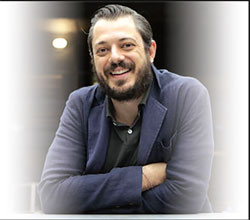Andrewsdirects Chekhov
Benedict Andrews can still quote by heart a letter he received 11
years ago, following his breakthrough production of Chekhov's Three
Sisters at the Sydney Opera House. “'I wish you luck with your career as
a director of music videos,'” it read, “so you can leave those of us who
fondly remember something called theatre to get on with it.”
Andrews is the kind of director who ruffles feathers. His eight-hour
staging of Shakespeare's histories in 2009 prompted one critic to groan:
“Benedict Andrews is my nightmare of what director's theatre can come
to,” while the Telegraph's review of his modernist, futuristic
production of Monteverdi's Return of Ulysses last year began with the
straightforward declaration: “I didn't like Benedict Andrews's new
production … one bit.” That original staging of Three Sisters was
clearly a sign of things to come: “I threw so many things at it. The
stage was covered in Star Wars toys, there was disco music playing. The
production was a mess, actually – in a good way.”
That was 2001, and Andrews was 29. Now 40, and one of Australia's
most admired theatre directors, he is tackling the play again, this time
for the Young Vic in London. The two productions will be completely
different, he says – not least because he himself has matured. “I'm much
more interested in people. All I really want to do is watch very good
actors playing and being truthful.”
|

Theatre director Benedict Andrews |
This is Andrews's third production in London this year, following his
luminous revival of Big and Small at the Barbican, in which Cate
Blanchett played a woman struggling to find her place in an uncaring
society, and his more challenging staging of Caligula at the English
National Opera; this filled the stage with the raked seats of a sports
stadium, connecting the volatile Roman to dictators through the ages.
His new setting for Three Sisters is similarly striking: Johannes
Schütz's design features a mound of mud instead of the forest of trees
that customarily surrounds the sisters’ country mansion. The cast, he
admits, were shocked when they first saw it.
Right from day one, he says, he expects his actors to be “emotionally
raw, and to not hide”. (Blanchett, who has collaborated with Andrews,
describes his rehearsal room as “muscular – brutal, even”.)
Instead of commissioning a new translation or working with an
existing one, Andrews wrote his own adaptation of the play, which was
completed by Chekhov in 1900: even on paper, his modern-language version
feels fiercely political, emphasising the characters’ sense of imminent
change during a period when communism was brewing. Much of its language
echoes the work of the radical philosopher Slavoj Žižek, whose
pronouncements on the collapse of capitalism have made him a darling of
protesters worldwide.
Andrews began his directing career in Adelaide, where he was born,
then spent a formative period at Berlin's Schaubühne, in the early 2000s
– a theatre renowned for full-on, full-frontal directing. His first
production there, of Sarah Kane's Cleansed, was “a real baptism by
fire”. It wasn't just that he couldn't speak the language: German
actors, he says, “leap to metaphor” and expect their directors to “have
ideas beyond the literal”. British actors (this production is his first
with an all-British cast) are more restrained. “I'm encouraging them to
break through that into something raw and sometimes messier,” he says.
Over the last few years, he has directed in Reykjavik, Berlin, and
Melbourne as well as in the UK; ask him where home is and he replies:
“There's sort of nowhere, yet.” He's hoping to settle in Iceland, where
his partner, choreographer Margrét Bjarnadóttir, lives and works, and
has turned down offers to run theatres in Australia to do so.
Even this, though, has fed his approach to the play. Living in “a
perpetual state of homesickness” has given him an insight into Chekhov's
siblings, stuck in their provincial backwater and dead-end lives,
perpetually yearning for Moscow. It is, he says, “an exemplar of what's
become a key condition for us, which is a homesickness in our own
lives”.
Andrews's sense of estrangement has fed his own work as a writer. In
the past two years, he has written four plays; so far, only one – Every
Breath, about a wealthy family facing an obscure threat – has been
staged, a production Andrews directed himself. This was received with a
degree of vitriol from Sydney's critics, one of whom dismissed the play
as “intellectual masturbation”. “They're not well-structured, well-made
plays,” Andrews says. “They do strange things, maybe too strange.
There's a kind of noise in them that people find a bit scary.”
Three Sisters will be frightening, he hopes, and speak to our own
anxieties about politics. “For me, it could just as easily be an
Icelandic banker, or someone who owns a supermarket chain, or the new
rich in Russia. People do not want to believe that there is a huge class
gap in society: we want to believe we're all part of this iPod world.”
Now, as in Chekhov's time, people have “a sense of end times, or a sense
that everything might collapse.”
The Guardian |





